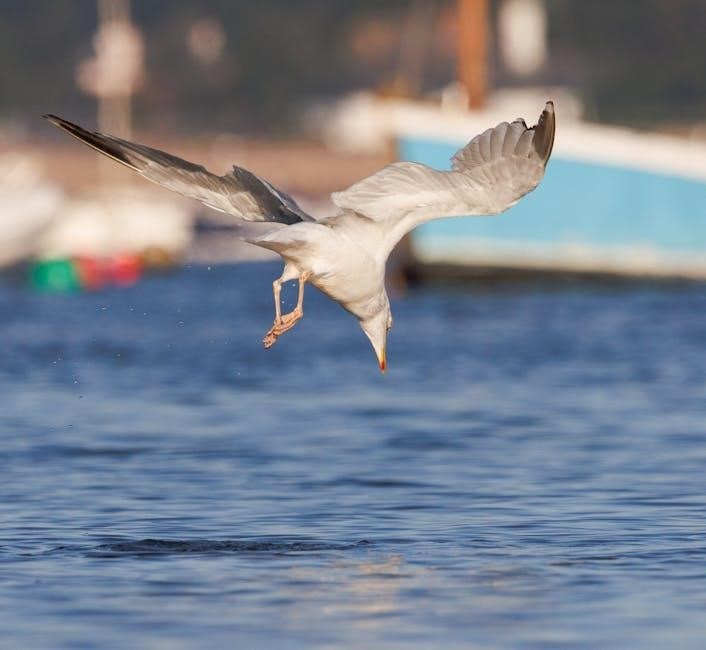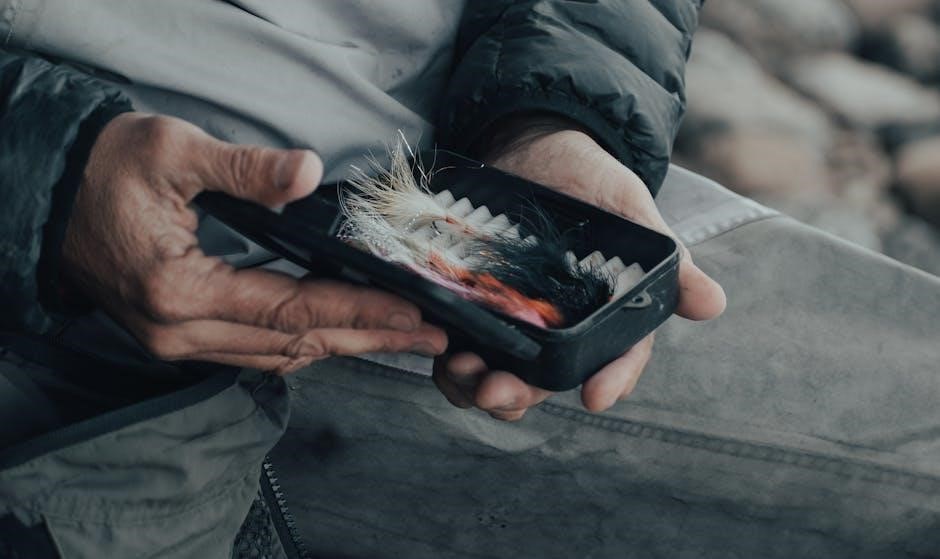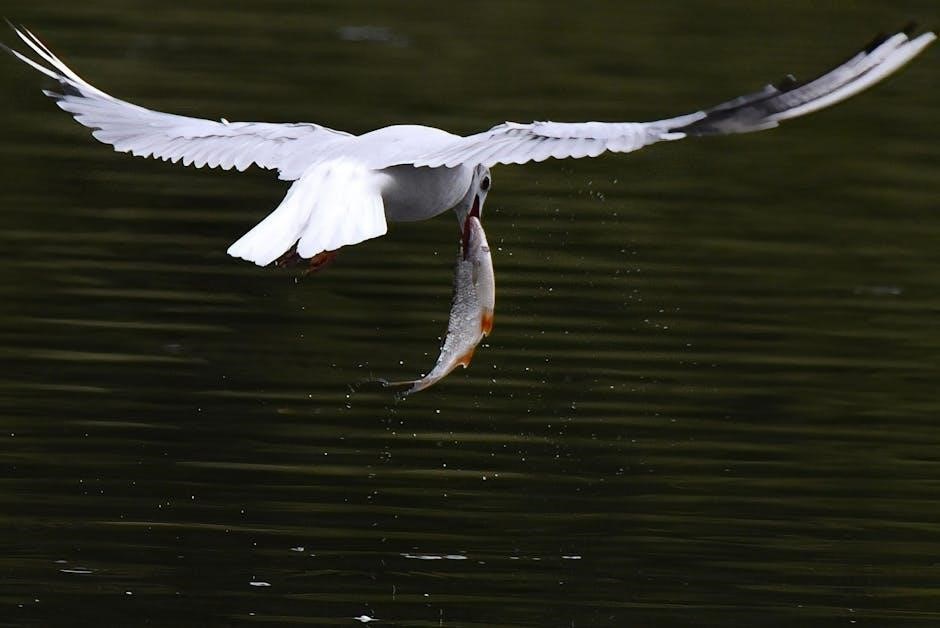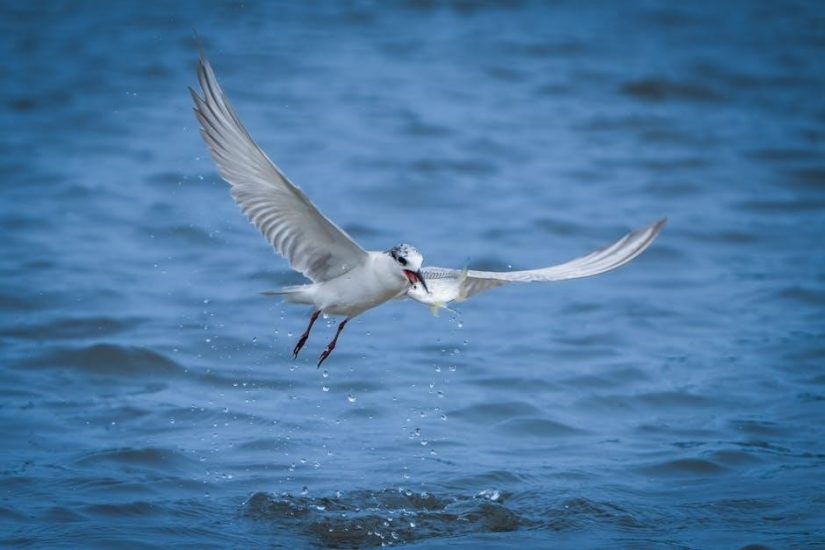Understanding the Role of a Fly Fishing Guide
A fly fishing guide serves as both an educator and outdoor expert‚ teaching anglers techniques‚ sharing local knowledge‚ and ensuring safe‚ enjoyable experiences. The role emphasizes teaching over personal fishing‚ requiring strong interpersonal skills‚ adaptability‚ and deep understanding of local ecosystems.
1.1 What Does a Fly Fishing Guide Do?
A fly fishing guide is responsible for teaching anglers various techniques‚ managing gear‚ and ensuring a safe‚ enjoyable experience on the water. Their primary role involves instructing clients on casting‚ knot-tying‚ and fly selection‚ while also providing insights into local fish behavior and habitat. Guides must be adept at navigating rivers‚ managing boats‚ and handling equipment. They also play a crucial role in environmental stewardship‚ promoting sustainable fishing practices. Beyond technical skills‚ guides must excel in communication‚ adapting to clients’ skill levels and preferences. The job requires patience‚ enthusiasm‚ and the ability to create memorable experiences‚ making it as much about mentoring as it is about fishing.
1.2 Key Skills Required for Success
To excel as a fly fishing guide‚ one must possess a mix of technical and interpersonal skills. Proficiency in fly fishing techniques‚ knot-tying‚ and equipment management is essential. Strong communication and teaching abilities are critical to instruct clients effectively. Guides must also demonstrate adaptability‚ handling diverse client skill levels and unpredictable weather conditions. Knowledge of local fish behavior‚ habitats‚ and regulations is vital for ensuring successful and sustainable fishing experiences. Additionally‚ guides need to be safety-conscious‚ with certifications in First Aid and CPR. Physical stamina and the ability to navigate challenging terrains are also necessary. Above all‚ patience‚ enthusiasm‚ and a genuine passion for fly fishing are key to creating memorable experiences for clients.

Building Your Fishing Skills and Experience
Developing expertise in fly fishing techniques‚ gaining experience in diverse environments‚ and understanding local fish behavior are crucial for becoming a skilled guide. Continuous practice and learning enhance proficiency.
2.1 Developing Expertise in Fly Fishing Techniques
Mastering fly fishing techniques is foundational for aspiring guides. This includes perfecting various casts‚ understanding line management‚ and learning effective knot-tying. Proficiency in nymphing‚ dry fly‚ and streamer techniques is essential. Guides must also understand how to adapt methods to different waters and conditions. Practicing regularly and staying updated on modern tactics ensures a high level of skill. Additionally‚ learning to troubleshoot common issues‚ such as tangled lines or missed fish‚ enhances a guide’s ability to assist clients effectively. Continuous improvement through workshops and hands-on experience strengthens expertise‚ making guides more confident and capable instructors.
2.2 Gaining Experience in Various Fishing Environments
Experience in diverse fishing environments is crucial for a fly fishing guide. This includes mastering techniques in rivers‚ lakes‚ and saltwater ecosystems. Each environment presents unique challenges‚ such as varying water flows‚ weather conditions‚ and fish behaviors. Guides must learn to adapt tactics to these conditions‚ ensuring they can effectively lead clients in any setting. Exposure to different species and their habitats broadens a guide’s knowledge base‚ making them more versatile. Spending time fishing in various locations throughout the year also helps develop a deep understanding of seasonal patterns and fish behavior. This diverse experience not only enhances a guide’s skill set but also builds confidence and credibility with clients.
2.3 Understanding Local Fishery Patterns and Behaviors
Understanding local fishery patterns and behaviors is essential for a fly fishing guide. This involves studying the seasonal changes in water conditions‚ fish migration‚ and feeding habits. Local knowledge of insect hatches‚ baitfish movements‚ and predator-prey relationships helps guides anticipate fish behavior. Recognizing these patterns allows guides to identify prime fishing locations and times‚ ensuring successful outings. Additionally‚ understanding local regulations and conservation efforts is crucial for sustainable guiding practices. By continuously observing and learning from the environment‚ guides can adapt their strategies to align with the ever-changing dynamics of the fishery‚ providing clients with a more informed and rewarding experience.

Certifications and Licenses Needed
Obtaining essential certifications like First Aid‚ CPR‚ and state-specific guide licenses is crucial. These credentials ensure compliance with local regulations and enhance credibility as a professional guide.
3.1 First Aid and CPR Certification
First Aid and CPR certification is a critical requirement for aspiring fly fishing guides. Accidents can occur on the water‚ and being trained to respond effectively is essential. Guides must handle injuries‚ such as cuts or broken bones‚ and know how to administer CPR in case of cardiac emergencies. Many states mandate these certifications‚ ensuring guides are prepared to maintain client safety. Regular renewal of these certifications is often required to stay updated on the latest medical practices. This training not only protects clients but also enhances a guide’s professional reputation and responsibility in the field. It’s a vital step toward becoming a reliable guide.
3.2 Obtaining Necessary State Licenses and Permits
Securing the proper state licenses and permits is a legal and procedural necessity for fly fishing guides. Each state has specific regulations‚ such as Montana requiring guides to work under a certified outfitter; In New York‚ a DEC Guide License is mandatory for all outdoor guides. These licenses ensure compliance with local fishing laws‚ environmental regulations‚ and safety standards. Additionally‚ permits for specific watersheds or protected areas may be required. Obtaining these credentials involves meeting state criteria‚ which may include background checks‚ insurance requirements‚ and proof of guiding experience. Adhering to these regulations is crucial for operating legally and maintaining a reputable guiding service.

Investing in the Right Gear

Investing in the right gear is essential for fly fishing guides. This includes high-quality rods‚ reels‚ waders‚ and accessories. Durable equipment ensures reliability and professionalism‚ both for guides and their clients.
4.1 Essential Equipment for Fly Fishing
To excel as a fly fishing guide‚ it’s crucial to invest in high-quality‚ essential gear. This includes a durable fly rod‚ reel‚ and line‚ tailored to various fishing conditions. A selection of leaders and tippet materials is vital for presenting flies effectively. Waders and sturdy boots are necessary for navigating rivers and streams comfortably. A reliable net‚ forceps‚ and fly boxes are also indispensable tools. Additionally‚ a well-stocked fly collection‚ covering various patterns and sizes‚ ensures you can match different hatch conditions. Investing in a good-quality fishing vest or pack helps organize gear efficiently. Lastly‚ polarized sunglasses and a first-aid kit are must-haves for both safety and effectiveness on the water.
4.2 Investing in High-Quality Gear for Clients
Providing high-quality gear for clients is essential for ensuring a positive and professional experience. Invest in durable‚ well-performing fly rods‚ reels‚ and waders that can withstand regular use. Clients expect reliable equipment‚ so opt for brands known for their craftsmanship and performance. Include extras like backup leaders‚ tippet material‚ and a variety of flies to accommodate different fishing scenarios. Comfortable‚ sturdy boots and breathable waders are crucial for long days on the water. Additionally‚ ensure all gear is clean‚ maintained‚ and appropriately sized for clients. Offering premium accessories like nets and polarized sunglasses can enhance their experience and build trust in your expertise. Quality gear reflects professionalism and enhances client satisfaction.

Communication and Client Management
Effective communication and client management are crucial. Guides must clearly explain techniques‚ listen to client needs‚ and build rapport to ensure a positive‚ memorable fishing experience.
5.1 Developing Strong Communication Skills
Strong communication skills are essential for a fly fishing guide. Clear‚ concise instruction helps clients understand techniques‚ while patience and empathy support anglers of all skill levels. Active listening ensures guides address client needs and concerns effectively. Developing a positive‚ encouraging attitude fosters confidence and rapport. Tailoring communication to individual learning styles enhances the learning experience. Additionally‚ guides must articulate local knowledge‚ such as fish behavior and environmental conditions‚ to maximize fishing success. Effective communication not only improves client outcomes but also builds trust and satisfaction‚ leading to repeat business and referrals. Mastering these skills ensures a memorable and enjoyable experience for clients.
5.2 Building and Maintaining Client Relationships
Building and maintaining strong client relationships is crucial for a successful fly fishing guide. Understanding client needs‚ preferences‚ and skill levels allows for personalized experiences. Being approachable‚ patient‚ and enthusiastic fosters trust and satisfaction. Sharing local knowledge and insights enhances the connection‚ making clients feel valued. Encouraging feedback and adapting to their expectations ensures a tailored experience. Following up after trips with thank-you notes or trip summaries shows appreciation and builds loyalty. Positive client relationships lead to repeat business and referrals‚ which are vital for long-term success in the guiding profession. A genuine passion for teaching and sharing the sport strengthens these bonds‚ creating lasting memories for anglers.
Business Considerations
Exploring business options‚ marketing strategies‚ and financial planning is essential for aspiring guides‚ whether working for an outfitter or starting a new venture. Success requires careful preparation and strategic decisions to establish a reputable and profitable guiding service.
6.1 Working for an Outfitter vs. Starting Your Own Service
Choosing between working for an outfitter or starting your own service is a crucial decision. Working for an established outfitter offers stability‚ client base‚ and resources‚ allowing you to gain experience and industry connections. On the other hand‚ starting your own service provides independence and potential for higher earnings but requires significant investment in marketing‚ licensing‚ and client acquisition. Both paths require dedication‚ but starting your own business demands additional skills in entrepreneurship and financial management to succeed in a competitive market.
6.2 Marketing Yourself as a Guide
Effective marketing is essential to attract clients and establish yourself as a reputable guide. Develop a strong online presence by creating a professional website and engaging on social media platforms. Share high-quality photos‚ testimonials‚ and detailed descriptions of your services. Networking within the fly fishing community‚ collaborating with local tackle shops‚ and participating in events can also help build your reputation. Consider specializing in a niche‚ such as targeting specific fish species or catering to novice anglers‚ to stand out. Word-of-mouth referrals are invaluable‚ so ensure excellent service and encourage satisfied clients to recommend you to others.
Continuous Learning and Professional Development
Continuous learning is crucial for staying competitive. Attend workshops‚ guide schools‚ and stay updated on new techniques and industry trends to refine your skills and adapt to changes.
7.1 Staying Updated on Industry Trends and Techniques
Continuous learning is essential for success as a fly fishing guide. Attend workshops‚ guide schools‚ and stay informed about the latest techniques‚ gear‚ and environmental changes. Networking with experienced guides provides valuable insights and tips. Subscribing to fishing magazines‚ watching instructional DVDs‚ and participating in online forums keeps you updated on industry trends. Additionally‚ experimenting with new methods and practices on the water helps refine your skills. Staying current ensures you can adapt to changing conditions and client needs‚ ultimately enhancing your reputation as a knowledgeable and effective guide. This commitment to growth not only benefits your clients but also keeps you competitive in the industry.
